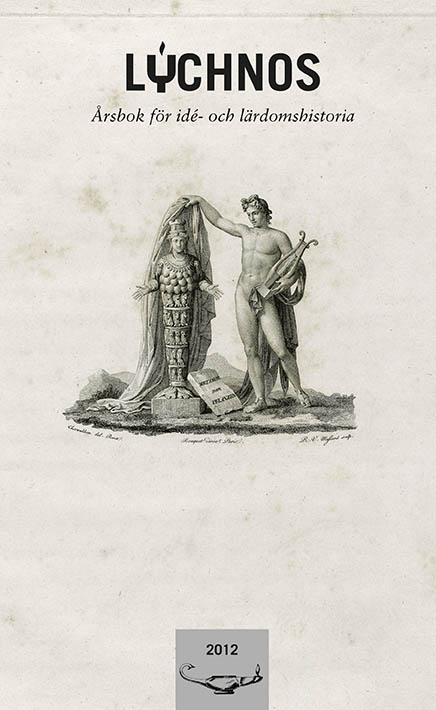Den naturliga skapelsen
Tidig svensk darwinism och religiös liberalism
Abstract
The reception of Darwinism in Sweden has been thoroughly studied by Ulf Danielsson in the 1960s. At that time it was common to believe that ideas of this kind spread from a scientific centre to a periphery in which they became more and more popularized. Danielsson noticed, however, that besides scientists, journalists too introduced Darwin’s evolutionary theory. This article is a closer study of these journalists and the reasons behind their interest in Darwinism. They are all shown to have had a liberal religious agenda.
The idea of an incompatibility between science and religion – in Sweden in the 1960s expressed as a barrier between ”knowledge” and ”belief” – has long since been questioned by historians of science. Darwinism is no exception. Liberal theology had already questioned the miracles of the Bible when Darwin’s evolutionary theory appeared, and liberal religious thinkers gave support to the idea of evolution from the start. In Sweden, the very first presentation of Darwin’s theory appeared in a Gothenburg newspaper just two months after the publication of On the Origin of Species. The editors of the newspaper were known to support liberal theology. One of them, the famous author Viktor Rydberg, became the best known advocate of liberal theology in Sweden. In connection with the newspaper Rydberg’s friend C. S. Warburg also started a periodical, which introduced new ideas, among them evolutionary theory. Warburg was bold enough to write about human evolution (a subject left out of Origin), which shows that he besides British influences formed his view by reading German, preferably idealistic, sources.
The most anticlerical views were expressed by Nils Lilja. Paradoxically, Lilja was employed by the Church of Sweden as a ringer, but he also worked as a journalist in the southernmost part of the country, and during the late 1850s and in the 1860s he educated people through lectures and books. In his writings he was very idealistic, presenting a general development and frequently an evolution in geological and biological contexts, even before Darwin’s theory was known. For him, the driving force of the world’s progression was divine love, and thus the natural laws stood in no contradiction to religion.
In the 1860s, the consequences of natural selection were seldom discussed. Around 1870, however, Darwinism seems to have been connected to materialism, probably as a consequence of German influences. Liberal religious journalists had to defend Darwinism from the accusations of materialism. In their periodicals, both C. F. Bergstedt and Carl von Bergen maintained that Darwinism was compatible with Christianity, though not with a literal reading of Genesis. A. F. Åkerberg, later on a Christian socialist, went so far as to discuss the natural causes of life itself, and hence made scientific research more of an alternative to Genesis. But no one of these journalists seems to have lost faith in the idea that evolution needed divine contribution.
It follows that the difference between supporters of liberal theology and their ”orthodox” counterparts could appear small. In Sweden, as in England, clergymen of the earlier nineteenth century often took natural theology seriously and understood creation as a process in agreement with geological and biological research. For example, all the Bridgewater treatises were translated into Swedish, as was Vestiges of the Natural History of Creation, which also passed as natural theology in the Swedish context. What really made a difference was the evolutionary theory of Darwin, because it made divine participation in creation more or less unnecessary. The liberal religious journalists, with their impersonal concept of God and resistance to miracles, found in Darwinism an ally in the fight against ”orthodoxy” and the use of natural theology, and thus their belief in a natural creation which was the opposite of all kinds of clerical positions. A more materialistic Darwinism would overrun them in turn, but that is another story.
Downloads
Publicerad
Nummer
Sektion
Licens
This work is licensed under a Creative Commons Attribution 4.0 International License. The copyright for the work published in Lychnos remains with the authors.


